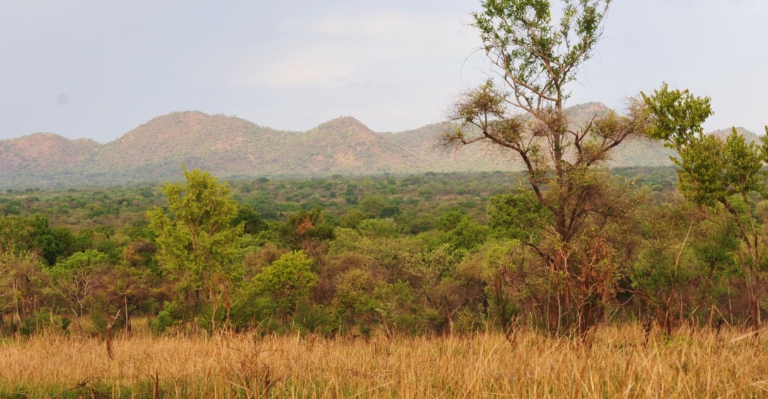The world’s top nature conservation experts, leaders, and decision makers have been gathering in Abu Dhabi for the World Conservation Congress, bringing together the membership of the International Union for Conservation of Nature (IUCN) in a once-every-four-years meeting. [1] On 24 September, a motion (057) on conflict sensitive conservation [2] was overwhelmingly passed, with all governments and Indigenous groups voting in favour. This motion is significant, as it articulates growing recognition of the importance of the relationship between nature, peace and security, whereas historically the conservation movement has been reluctant to speak out publicly on this.[3] It comes amidst building momentum to proactively explore the intersection between conservation and peacebuilding and to integrate conflict sensitivity as a practical means to help conservation organisations better navigate the challenges of working in volatile contexts and to centre local populations in their efforts. This is particularly important because many biodiversity hotspots are in areas that experience conflict, instability and weak governance, making conservation efforts especially complex.
This acknowledgement of the importance of conflict sensitivity is also part of wider discussions around the bolder, transformative change that is needed within conservation. One of the five themes at the IUCN WCC has been ‘delivering on equity’, based on the recognition that ‘achieving true conservation and environmental justice means placing the voices of Indigenous Peoples, women, youth, civil society, and rangers at the centre of action.’ There have been a range of panels delving deeper into some of these issues, including on decolonising conservation [4] and transitioning to progressive rights-based models that recognise the importance of Indigenous people and local communities and others exploring the relationship between conservation and environmental justice.
Why is conflict sensitivity important for conservation?
Conservation cannot occur in isolation – it often takes place in complex socio-political contexts where tensions can arise. Conflict sensitivity can provide knowledge and tools to prevent tensions from escalating, but also go further to actively support social cohesion, peacebuilding and sustainable outcomes for both people and nature. At its core, conflict sensitivity it is about building an understanding of a context, understanding how conservation projects and activities might interact with that context, and seeking to tailor and adapt that action to mitigate unintended negative consequences and achieve the best possible impact.
Another useful development at this year’s Congress is the launch of a new online conflict-sensitive conservation course [5] hosted by the IUCN Academy, which offers a practical, accessible and free resource which is designed especially for a conservation audience. This new resource also explores the connections between conflict sensitivity and important themes such as human rights, gender and inclusive community-led conservation.
Members of the Environment Climate Conflict and Peace Community of Practice (a global network of over 1000 members) [6] have been very active across all these initiatives, based on their rich practical experience of working at the intersection of biodiversity, climate change, conflict, peace and environmental justice. There is hope that this conversation on conflict sensitivity will continue at the upcoming United Nations Environment assembly, which will take place from 8 to 12 December.
Conflict sensitive conservation in practice: South Sudan
In parallel to the launch of the global online course, the Conflict Sensitivity Resource Facility (CSRF) in South Sudan has also developed and piloted an in-person training course which is specifically designed for conservation practitioners in South Sudan (members of the CSRF also participated in the review committee for the global training mentioned above). This week, the CSRF, represented by Saferworld, is a member of a panel at Geneva Peace Week [7] to highlight the importance of tools and approaches which can help to deepen understanding and practically navigate the challenges of working at the nexus of climate change, nature, peace and security.
South Sudan has extremely rich biodiversity and an abundance of natural resources [8] which is of national, regional and global importance, including the largest mammal migration on the planet and 12 Key Biodiversity Areas (globally significant sites for conservation where unique species and ecosystems occur). However, due to persistent violent conflict, there has been limited investment in wildlife conservation and protected area management in the country, though some international organisations have worked in South Sudan over many years.
As outlined in a recent analysis paper [9] published by the CSRF, the context for conservation is complex and connects with important conflict dynamics, and effective approaches must be centred on and led by the people and communities that live alongside South Sudan’s vast biodiversity. Another recent paper also focuses on the critical role that communities should play [10] in the growth of the conservation sector in South Sudan, especially given the extent to which wildlife conservation and land management knowledge and practices have been deeply enshrined in the lives of South Sudanese communities that live around wildlife areas.
In recent years, there has been increased interest in the huge potential in wildlife conservation and the associated economic benefits that might one day come from it (such as tourism). However, such opportunity also comes with risk if interest results in poor management or unintended negative consequences that jeopardise the livelihoods of communities, undermine wildlife protection and exacerbate conflict, inequality and environmental degradation. As volatility has increased this year in South Sudan, there is also a continued need to recognise the essential role that nature and biodiversity play in human security, including vulnerability and humanitarian outlooks, and in long-term prospects for socio-economic development and sustainable peace. The CSRF will continue to build on this work to support conflict sensitive conservation in South Sudan alongside cross-sectoral engagement with the aid community, and to stay connected with the global momentum towards system-wide changes.
[1] https://www.ecosystemforpeace.org/csc?utm_source=substack&utm_medium=email
[2] https://iucncongress2025.org/assembly/motions/motion/057
[3] https://ceobs.org/preview-nature-peace-and-security-at-the-world-conservation-congress/
[4] https://iucncongress2025.org/programme/high-level-panel-inclusive-locally-led-conservation
[5] https://iucnacademy.org/courses/conflict-sensitivity-conservation-principles-practice/
[6] https://www.ecosystemforpeace.org/csc?utm_source=substack&utm_medium=email
[7] https://www.genevapeaceweek.ch/en/programme/from-tipping-points-to-turning-points-tools-for-climate-peace-and-security
[8] https://csrf-southsudan.org/repository/environment-conflict-and-peace-in-south-sudan-implications-for-conflict-sensitive-aid/
[9] https://csrf-southsudan.org/repository/csrf-research-the-people-in-south-sudans-wildlife-conservation-story/
[10] https://csrf-southsudan.org/repository/csrf-analysis-conservation-with-the-people-considering-local-communities-perspectives/



